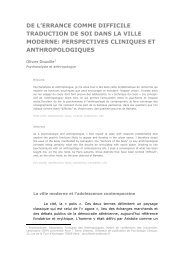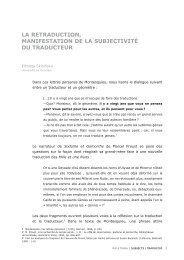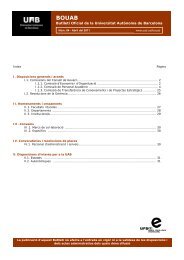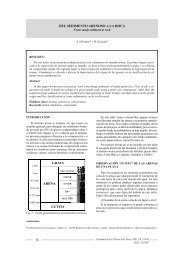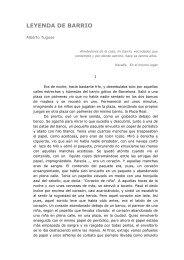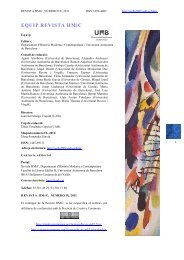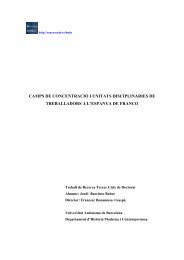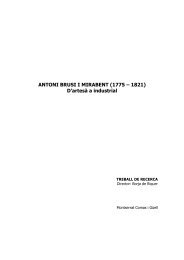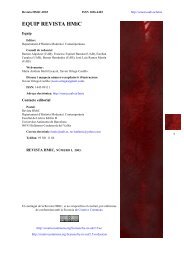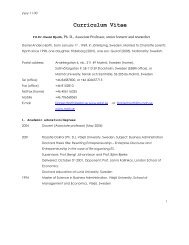EQUIP REVISTA HMiC - Universitat Autònoma de Barcelona
EQUIP REVISTA HMiC - Universitat Autònoma de Barcelona
EQUIP REVISTA HMiC - Universitat Autònoma de Barcelona
Create successful ePaper yourself
Turn your PDF publications into a flip-book with our unique Google optimized e-Paper software.
Marginalization Insi<strong>de</strong>-Out:Thoughts on Contemporary Chinese and Sinophone Literature<br />
conjuncture. Discussions about issues like perspective, cross-cultural transfer, politics and<br />
universalism—just to name a few—are nowadays as relevant in Comparative Literature as they<br />
are in History, for instance.<br />
Standing at this interdisciplinary crossroad and watching how contemporary Chinese<br />
literature passes by, in the following pages I want to explore several features and dynamics of<br />
these literary works that, I think, may also be relevant for other aca<strong>de</strong>mic disciplines, such as<br />
History, Anthropology or Translation Studies. By giving visibility and using Chinese literature<br />
as a synecdoche for the whole set of Chinese and even other non-Western cultures, it is my<br />
intention to spur the discussion about how China and Chinese culture should be taken into<br />
account in the Humanities in the West, especially in the Catalan and Spanish aca<strong>de</strong>mic context.<br />
Consi<strong>de</strong>ring the global and transnational society that inescapably surrounds their work, Western<br />
scholars are urged to consi<strong>de</strong>r new ways of approaching and <strong>de</strong>aling with their object of study,<br />
whatever it might be. But this new scenario is particularly critical when confronting (or when<br />
<strong>de</strong>ciding not to confront) broad and vague categories such as “China,” “East Asia” or even<br />
“Asia.” The concerns I will <strong>de</strong>velop next, then, want to help these scholars reconsi<strong>de</strong>ring their<br />
own position and framing their inquiries by being aware of the discriminations such a position<br />
may entail.<br />
I will present two discourses of oppression that capture contemporary Chinese literature<br />
from a double flank. On the one hand, not being part of “Western” literature, Chinese literature<br />
remains unknown and marginalized outsi<strong>de</strong> China and the Chinese speaking communities. On<br />
the other hand, due to internal mechanisms of oppression—political, geographical and, as we<br />
will discuss, also chronological—there are parts of Chinese literature that remain equally<br />
marginalized from the insi<strong>de</strong> of the field. More specifically, in the next sections I will examine<br />
some of the challenges that contemporary Chinese literature must face in or<strong>de</strong>r to move (at least<br />
in a Utopian way) beyond the “minority” label from which it is usually conceived—either<br />
implicitly or explicitly—from our Western perspective. Without leaving Utopia, these<br />
reflections would like to be translated, in more practical terms, into a non-restrictive inclusion<br />
of Chinese literature and culture within aca<strong>de</strong>mic curricula in disciplines like Comparative<br />
Literature, History or Translation Studies, among other sorts of aca<strong>de</strong>mic, social and<br />
institutional recognitions—especially, again, in the Catalan and Spanish context. But above all,<br />
these reflections would like to invite comparative scholars who do not specifically <strong>de</strong>al with<br />
“China” or the “East” to reflect on the possibilities they have and their ethical role in<br />
confronting or ignoring them.<br />
At this point, three previous clarifications are probably required. First of all, “any attempt to<br />
<strong>de</strong>fine Chinese literature in terms of the old geopolitics will risk instant anachronism.” 3<br />
According to the theoretical approaches started in the 1980s, an exclusive conception of<br />
Chinese literature as only the writings from the People’s Republic of China (hereafter, PRC)<br />
would certainly be misleading. Here I will set the discussion upon the limits of the sometimes<br />
vague, controversial but, at the same time, useful concept of “Cultural” or “Greater” China,<br />
particularly in vogue since the last <strong>de</strong>ca<strong>de</strong> or so. 4 I will consi<strong>de</strong>r, then, the literary texts written<br />
3. Wang, David Der-wei, “Afterword: Chinese Fiction for the Nineties,” in Wang, David Der-wei, ed.,<br />
Running Wild: New Chinese Writers. New York: Columbia University Press, 1994, 238.<br />
4. For a complete analysis of this concept, see Tu, Wei-ming, “Cultural China: The Periphery as the<br />
Center,” in The Living Tree. The Changing Meaning of Being Chinese Today. Stanford: Stanford<br />
University Press, 1994, 1-34. A similar concept, but tripartite into the political, economic and cultural<br />
spheres, is examined in <strong>de</strong>tail in Harding, Harry, “The Concept of Greater China: Themes, Variations<br />
and Reservations,” in The China Quarterly, no. 136 (1993): 660-686.<br />
http://seneca.uab.es/hmic Revista <strong>HMiC</strong>, número IV, 2006<br />
42



